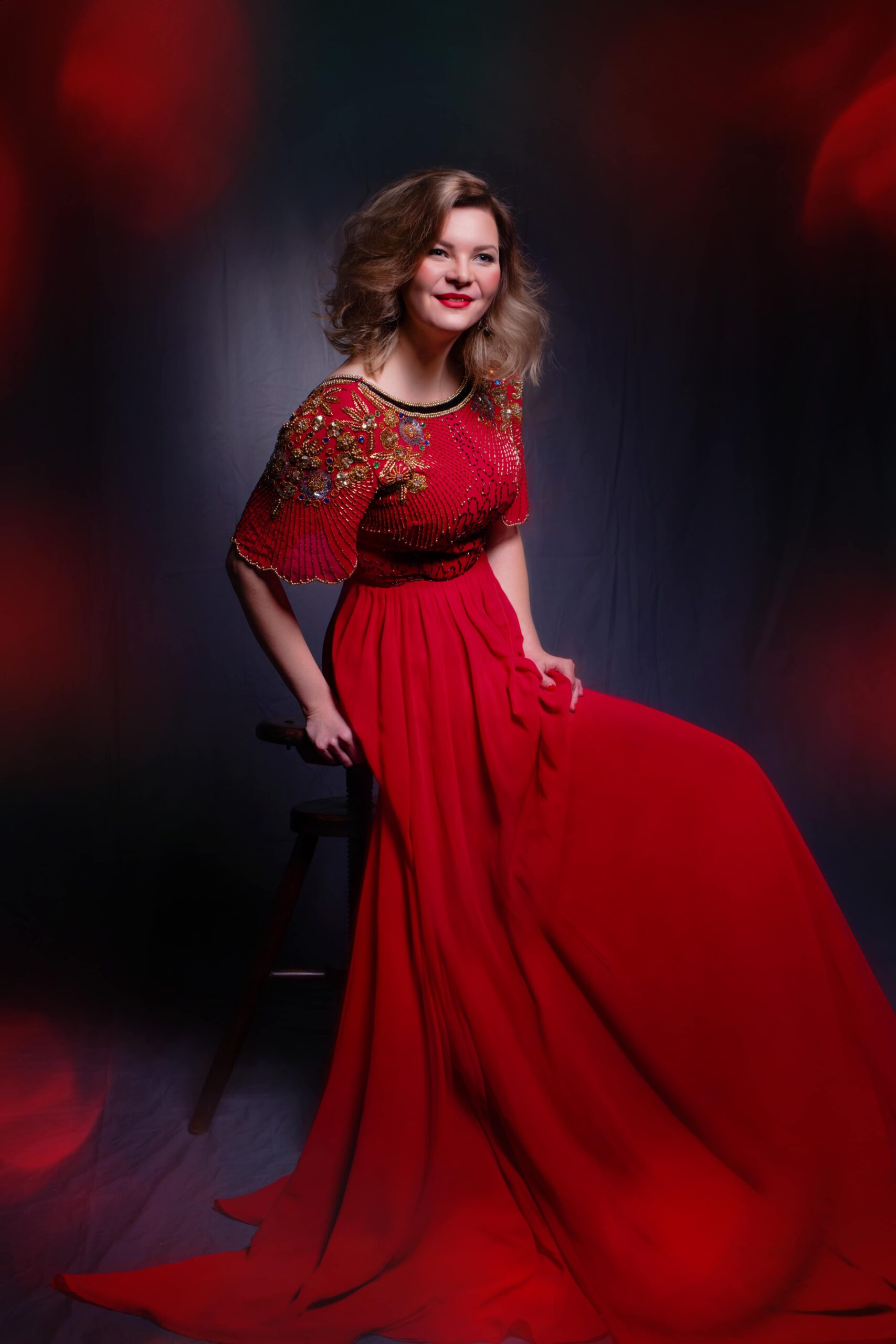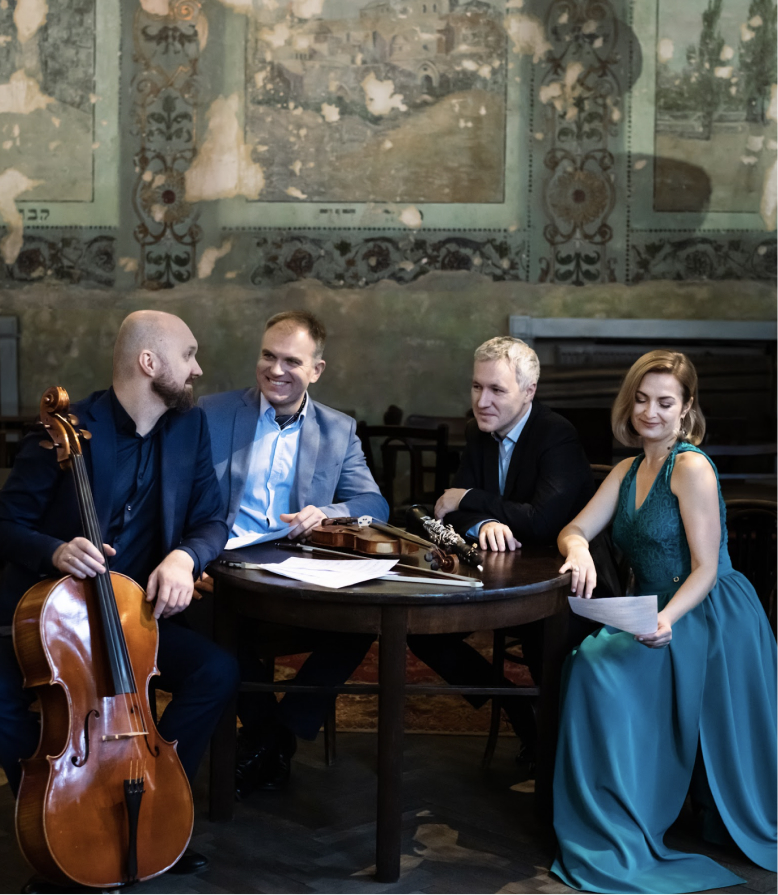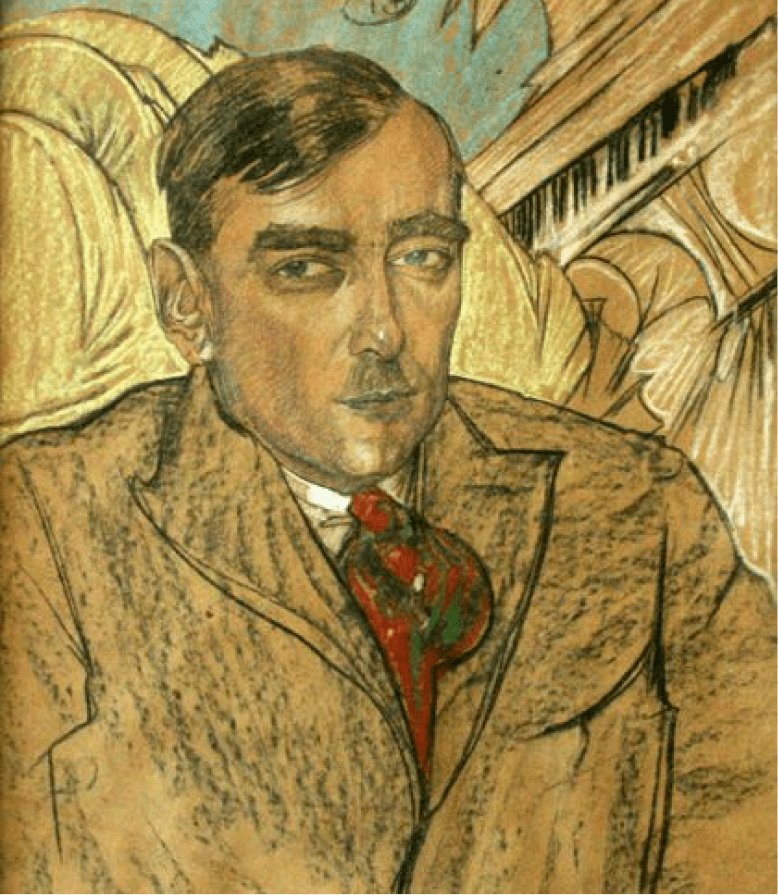
Karol Szymanowski
The stunning music of Karol Szymanowski in two versions for voice and piano, and for violin and piano.
1st scene – Karol Szymanowski & Karol Rathaus for voice and piano
Artists:
Roksana Wardenga – mezzo-soprano,
Aleksandra Hałat – piano.
Aleksandra Hałat invited to the project the talented and titled mezzo-soprano Roksana Wardenga, with whom they both made the world phonographic premiere of Karol Rathaus’s song (DUX 2022) and presented it to the public for the first time in Poland.
The juxtaposition of Karol Szymanowski’s work with the work of Karol Rathaus is not accidental. Both composers have a lot in common, both being representatives of the German school of composition. Moreover, K. Szymanowski’s work, similarly to the work of Franz Schrecker – a teacher, mentor and authority of Karol Rathaus, is described as a combination of German romanticism with French impressionism. It seems intriguing and significant that, not without a reason, the audience during the concert will be able to find echoes of Karol Szymanowski’s extraordinary music in the works of Karol Rathaus – this is due to Grzegorz Fitelberg, who popularized K. Szymanowski’s artistic output in the USA.
During the concert, the audience will be able to move into the extraordinary world of poetry by listening to songs to the lyrics of William Shakespeare, E. J. Coatsworth, T. S. Eliot, Emily Dickinson, Dorothy Parker, E.E. Cummings and Jan Kasprowicz, as the programme includes two series of songs by Karol Rathaus entitled “Three English Songs” op. 48 for voice and piano (1942) and “Five Moods after Amercican Poets” for voice and piano (1946). Both series were created in the period of Karol Rathaus’s emigration to the USA. Apart from K. Rathaus’s songs, the project involves the performance of “Three Fragments from Jan Kasprowicz’s Poems, op. 5”, which is described as one of the most remarkable manifestations of Szymanowski’s youthful talent and an outstanding work in the scale of European neo-romanticism.
The juxtaposition of the artistic output of K. Szymanowski and K. Rathaus will introduce the audience into the atmosphere of metaphysics intertwined with elements of folk religiousness and will allow listeners to experience a real manifestation of Young Poland symbolism.
Programme:
1. K. Szymanowski – Three fragments from poems by Jan Kasprowicz op.5
-
Święty Boże [Holy God]
-
Jestem i płaczę [I am here and I am crying]
-
Moja pieśń wieczorna [My evening song]
The song cycle “Three fragments from Jan Kasprowicz’s poems for voice and piano op. 5” by Karol Szymanowski was written in 1902. The composer used some fragments of poems by Jan Kasprowicz from his latest poetry collection entitled “To the dying world”, which was re-issueed in 1921 together with the collection “Salve Regina” under the joint title “Hymns”. The name “Hymns” is also used in reference to Szymanowski’s work, which was first published (by Gebethner and Wolff) in 1928 and had the dedication “In memory of the Great Poet Jan Kasprowicz”. For Szymanowski, the works of this Young Poland poet were “a revelation of great poetry”. What is present in Kasprowicz’s “Hymns” are decadent moods, full of spiritual anxiety, symbolism and metaphysics, typical of the works of Young Poland poets.
2. K. Rathaus -Three English Songs op. 48 for voice and piano (1942)
- Sweet Music
- As I ride
- The Oblation
3. K. Rathaus – Five Moods after American Poets for voice and piano (1946)
- My sweet old etcetera
- Frustration
- Indian summer
- Conversation Galante
- Pretty futility
Vocal lyricism was the favorite artistic form of composers already in the 19th century and Rathaus composed songs to the texts by German poets since his student days. Unfortunately, they have not survived. What has been left are some later works on English poetry – Three English Songs op. 48 (1941-43) and on American poetry – Five Moods after American Poets op. 57 (1946). Rathaus chose works by very distant (from him) authors, such as William Shakespeare and two representatives of the Victorian era: Robert Browning and Algernon Charles Swinburne (op. 48) or American authors, such as: Elizabeth J. Coatsworth, Emily Dickinson, Dorothy Parker, Edward Estlin Cummings, Thomas Stearns Eliot (op. 57).
Reaching out to so many different texts confirms the broad mind and thorough education of the composer, who was convinced of the need for an intellectual approach to music, as recalled by his university colleagues.
2nd scene – a compilation of the works of Karol Szymanowski and Karol Rathaus for violin and piano
Artists:
Marcin Hałat – violin,
Aleksandra Hałat – piano.
Karol Szymanowski’s compositions specially selected for the project were created in the first three decades of the 20th century. They are a unique invitation to get acquainted with the outstanding music of Karol Szymanowski. The audience will be able to listen to the wonderful “Sonata in D minor”, op. 9, with distinct neo-romantic features, influenced by the music of J. Brahms and A. Scriabin, the beautiful “Romance in D major”, op. 23, dedicated to his friend Paweł Kochański and the captivating “Myths”, which clearly refer to impressionism.
In addition to the works of the Young Poland composer, the audience will hear two works by Karol Rathaus for violin and piano. The first, Pastorale and Danse [sic!] op. 39 was written by the composer in 1937 in London, where – despite his wandering – he was extremely happy with his wife and friends. This two-part work reveals extraordinary craftsmanship, the richness of compositional thought and an exceptional variety of narratives.
The second – Dedication and Allegro, op. 64 (1949) – Hommage à Chopin for violin and piano, delightfully amazes with its rhythmic layer, a characteristic distribution of accentuation and its improvisational character, reminiscent of jazz elements.
Programme:
1. Karol Szymanowski
- Nocturne and Tarantella [Nokturn i
- Tarantella], op.28
- Myths [Mity], op.30
- Fountain of Arethusa [Źródło Aretuzy]
- Sonata in D minor [Sonata d-moll] op. 9
- Roxana’s Song [Pieśń Roksany]
- Kurpie Song [Pieśń kurpiowska]
- Lullaby [Kołysanka]
- Song from „Harnasie” [Taniec z „Harnasiów”]
- Romance [Romans] op.23
2. Karol Rathaus
- Dedication and Allegro op. 64 (1949) – Hommage à Chopin
- Pastorale and Danse [sic!] op. 39 (1937)
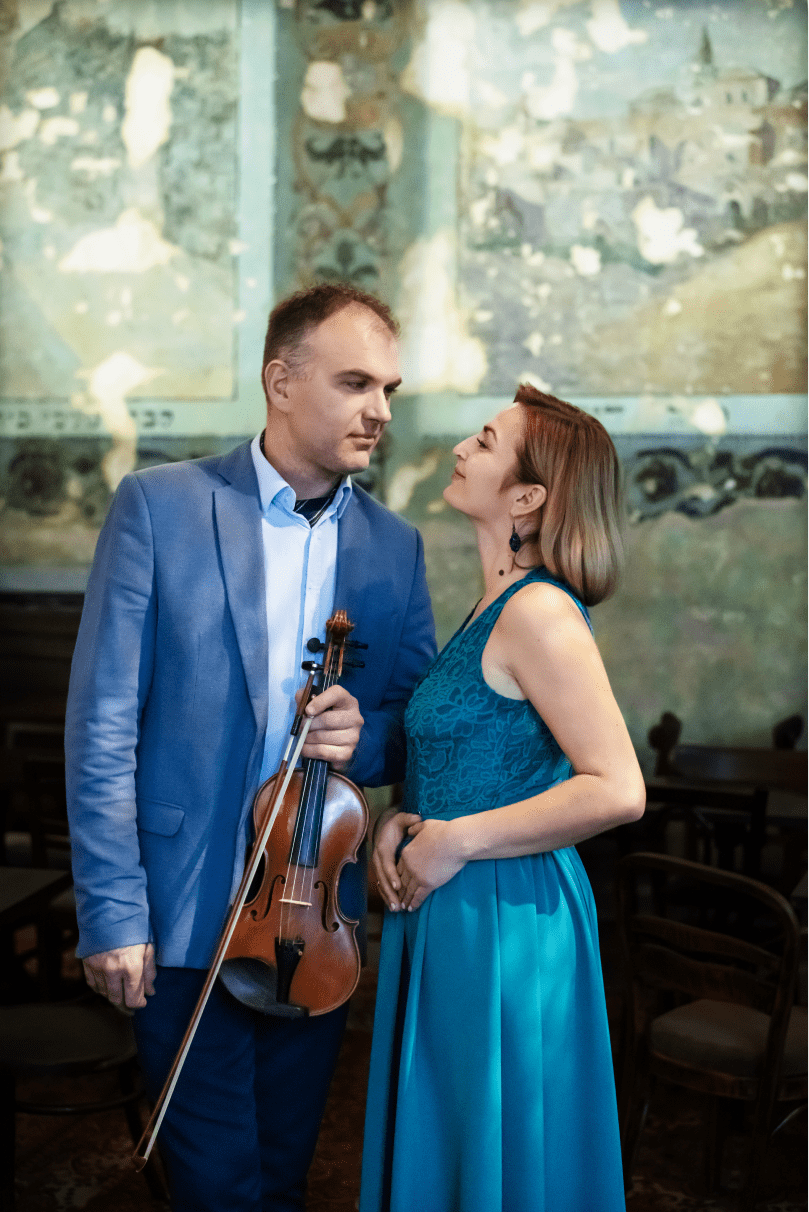
Roksana Wardenga
She has graduated from prof. Jan Ballarin vocal class in The Karol Szymanowski Academy of Music in Katowice.
She is a finalist: 22nd Mikulas Schneider – Trnavsky International Vocal Competition in Trnava (2017). The I National Vocal Competition im. Bogdana Paprockiego in Bydgoszcz (Prize Director of the Baltic Opera Jose Maria Florencio 2019).
She is a laureate of: The X Międzyuczelniany Konkurs Wykonawstwa Polskiej Pieśni Artystycznej im. Edmunda Kossowskiego. She received a special award for performing Ignacy Jan Paderewski’s song (2012). The first award in The Imrich Godin International Vocal Competition Iuventus Canti 2013 in Vrable (Slovakia). The first award in the VI National Vocal Competition im. K. Kurpińskiego in Włoszczakowice (2014). The second award in the III Andrzej Hiolski International Singing Competition in Kudowa Zdrój (2014). The second award in the 4th International Jan Kiepura Vocal Competition in Krynica-Zdrój (2016). The first award in the II National Vocal Competition “Bella Voce” in Busko Zdrój (2018). The first honourable mention in the VI Vocal Competition im. I. J. Paderewskiego in Bydgoszcz (2018). The first award in the III International Solo- Sacrum Competition in Katowice (2019).
She takes part in concerts, recitals, festivals and opera performances. The singer has performed, among others, at the following festivals: Daegu UNESCO Music Festival 2021, Chopin in Gaming (Austria), Witold Lutosławki “Chain X” in Warsaw, Adam Didur in Sanok, Viva il Canto in Cieszyn, Ave Maria in Czeladz, Organ Music in Gliwice, Summer Drezdenko Chamber Music Meetings, Krzyż Of Greater Poland, Sacred Music of Stanisław Moniuszko in Warsaw. She cooperated with, among others, the Korean Symphony Orchestra, the Janackova Philharmonic in Ostrava Polish Radio Orchestra in Warsaw, the Podlasie Opera and Philharmonic Orchestra, the City of Tychy Aukso Orchestra, the Kraków Philharmonic, the Silesian Philharmonic, the Podkarpackie Philharmonic, the Wałbrzych Philharmonic, the Zabrze Philharmonic, the Orchestra of the Bydgoszcz Opera, the Philharmonic Świętokrzyska. She was conducted by Bassem Akiki, Mirosław Błaszczyk, Francesco Bottigliero, Massimiliano Caldi, Sławomir Chrzanowski, Jerzy Dybał, Krzysztof Dziewięcki,Heiko Mathias Förster, Jan Wincenty Hawel, Robert Kabara, Michał Klauza, Jerzy Kłosek, Jakub Kontz, Florian Krumpock, Marek Moś, Riccardo M Sahiti, Piotr Sułkowski.
More projects
© 2022 Aleksandra Hałat | Privacy policy
Stay updated
© 2022 Aleksandra Hałat
Privacy policy
